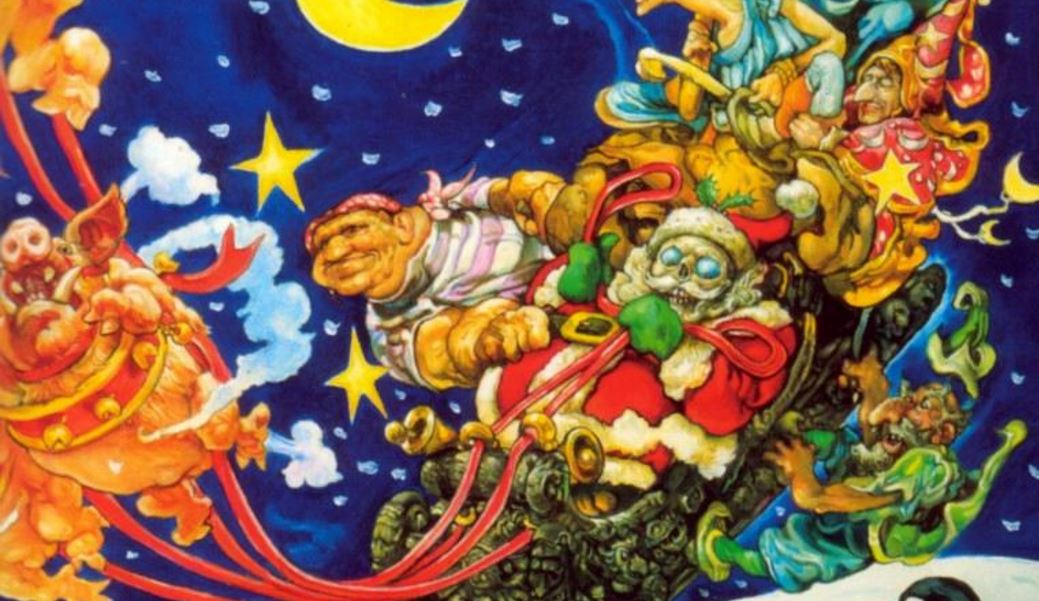 ‘Hogfather’ is the book that many people consider to be the jewel in the crown of the Death Arc, perhaps beaten only by ‘Reaper Man’. It certainly has one of the easiest to follow plots of the Death books, which I am supremely grateful for – you’ll probably remember that, for whatever reason, I have found the Death books to be quite impenetrable on this re-read. I think that, in a way, really examining these books for details and patterns has meant that I am forced to consider that some of the plotlines do not hold up to such intense scrutiny. I’ve said it before and I’ll say it again; Sir Terry’s strength has always been in character building.
‘Hogfather’ is the book that many people consider to be the jewel in the crown of the Death Arc, perhaps beaten only by ‘Reaper Man’. It certainly has one of the easiest to follow plots of the Death books, which I am supremely grateful for – you’ll probably remember that, for whatever reason, I have found the Death books to be quite impenetrable on this re-read. I think that, in a way, really examining these books for details and patterns has meant that I am forced to consider that some of the plotlines do not hold up to such intense scrutiny. I’ve said it before and I’ll say it again; Sir Terry’s strength has always been in character building.
The premise is simple enough here; the Auditors, who run the universe, have taken out an assassination contract against the Hogfather (Discworld’s Father Christmas) and he disappears the night before Hogswatch. Death takes it upon himself to do the Hogfather’s job, delivering toys that night, whilst his granddaughter Susan does the actual hard work of figuring out exactly what is going on. Susan has become a regular character at this point in the series and I think this is her strongest story by far. She knows who she is by now, even though she doesn’t necessarily like it, and she is prepared to do what needs to be done.
I particularly enjoyed her reunion with the wizards, who I tend to think are stronger as supporting characters rather than when they star in their own stories. Their odd blend of genius and utter stupidity is amusing to a certain extent, but it does start to grate after a while. Here, with Susan and Death very much the central players, the wizards are freed up to be quite as mad as they like, sometimes offering a solution that is halfway useful, or at least having a vague idea of what might be happening.
Susan first met Ridcully in ‘Soul Music’ and I liked their partnership here. Ridcully, slightly saner than the rest of the wizards, bridges the gap well between the others in the university and Susan, a relatively normal person. I think it is put well enough when Susan tells the ‘oh god’ that the wizards are the cleverest men in the world and he says, ‘And I’m sober, am I?’ They are mad, there is no question of it, and Ridcully is the best of them. Even he, however, has a kind of childlike innocence that is very endearing. He adores Hogswatch and everything that comes with, even the cracker jokes, whilst the rest of the wizards, in a rare moment of cynicism, hate the whole celebration. He is genuinely upset at their words, and I think that sums his character up fairly well. Beneath all of his bluster and sarcastic comments, he is a genuinely good man, as are most of Sir Terry’s main characters. They may struggle with it sometimes, and the very idea of what it means to be so, but in the end they are always that; good, good people.
Death, as the main character, has some of his most profound philosophical realisations in this story, ones that have really stuck with me since the first time I read it. His rant about fairness, about the differences between rich and poor, is really something, as he ‘didn’t have the kind of mind that could ignore all the other stuff [people living in poverty]. And so it hurt him.’ Death is ‘only’ an anthropomorphic personification of an idea, a concept, yet he has developed into one of the most empathetic characters on the Disc. He also makes what I think is probably his most famous speech at the end of this book, about belief and fantasy and the nature of being human: ‘HUMANS NEED FANTASY TO BE HUMAN. TO BE THE PLACE WHERE THE FALLING ANGEL MEETS THE RISING APE.’ If anyone were ever to question the value of Sir Terry’s Discworld in a world full of more ‘serious literature’, I would just show them this page of ‘Hogfather’ and let them work it out for themselves. I don’t think anyone could answer the critics better than one of Sir Terry’s finest creations.
Favourite Quote:
“…and then Jack chopped down the beanstalk, adding murder and ecological vandalism to the theft, enticement and trespass charges already mentioned, but he got away with it and lived happily ever after without so much as a guilty twinge about what he had done. Which proves that you can be excused just about anything if you’re a hero, because no one asks inconvenient questions.”
Some of the coverage you find on Cultured Vultures contains affiliate links, which provide us with small commissions based on purchases made from visiting our site.

